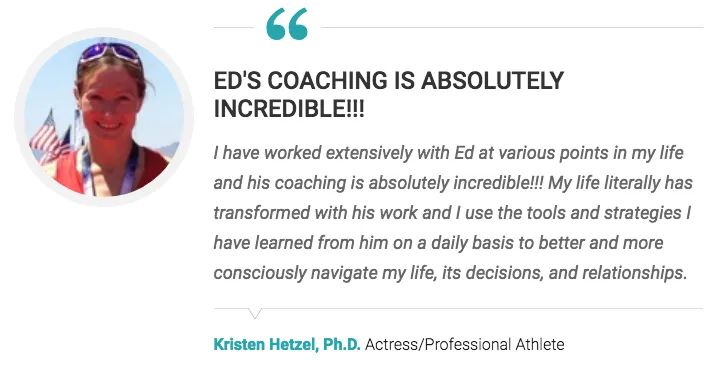Doing The Work

When you hear the phrase “doing the work” what does it make you think about? In a nut-shell, doing the work means realizing how our early life memories are constantly influencing our decisions today. Doing the work means challenging your beliefs and behaviors that are leading to poor outcomes. It also means having the courage to be vulnerable and expressing your truth in order to allow your brain to take in new information.
Let’s step back for a moment and look through a wider angle at life. As human beings, we are born at the mercy of our caregivers and our biology system will respond accordingly. We have a safety system and a memory system that is constantly recording and adjusting its response to life. We are meaning-making machines. Early life patterns-responses become habituated if repeated enough times. If we repeat patterns enough times, we don’t even consider questioning them. Beliefs and behaviors are words we use to describe these patterns.
Ultimately, if you want better results in your life, you’ll need to question some of your beliefs and behaviors. To do this, simply ask: “Do I like the results I’m getting?” If you don’t, you have four choices: you can stay stuck and helpless (feeling like a victim), you can blame the rest of the world for your problems, you can get curious about how you are contributing to the outcome, or you could just ignore the whole thing and continue on about your business.
Your memory system and the behaviors you default to throughout your life will reflect your parents’ skill level. Of course, there are other factors that influence beliefs and behaviors, but they have the biggest initial impact. It’s also important to consider, your safety system wants to guarantee your survival. And you don’t really have a choice in this matter until you develop more of your brain as you age. It’s part of the way human brains are wired. What that means is, even when something doesn’t feel good, you may follow along to guarantee your survival or to maintain harmony. To cope with stress early in life, between 0 and 7 years of age, our brain defaults to fear based strategies hard wired into us related to the fight, flight, freeze response.
Now there are many routines that are automatic to guarantee survival. Consider the fight, flight, freeze response. For much of my life, I used to shut down (freeze response) and get really quiet when there was a conflict with another person. Why is that? Because it was dangerous to tell the truth when I was a little kid. So in my brain, conflict used to be linked up with what I assumed were life or death situations.
A “fight” response during conflict might look like somebody getting a frown on their face, raising their voice and threatening you. An argument would be another example of a fight response.
What we now know from many, many studies when we use fear-based responses, we usually trigger a fear-based response in the other person. So fear based responses are not very practical to use. Knowing what fear feels like in your body is a superb skill to gain. It’s wise to recognize when you’re using or about to use a fear-based response and stop it before you continue further. In time, and with a little practice, a better idea is to shift into your heart, realize what’s happening and choose a different path (Easier said than done, right?). You can still maintain healthy boundaries and be in your heart.
Another pattern I’ve seen a lot is; people will dismiss or dissociate an experience because the pain is too great or they do not know what to do with something that feels terrible. When we are little, we repeat patterns. If we repeat them often enough, we don’t even consider questioning them later in life. They become unconscious. We assume that is just the way life works. In this scenario, doing the work would be reflecting on the result you just got and getting curious about what was your part in the outcome you just got. Reflection is the portal to discovering what is going on in the unconscious mind.
Doing the work is about learning how to discover the parts of us that are creating bad outcomes. What unconscious thoughts lead to destructive behaviors and beliefs? What part of us is on autopilot that we need to question? Neuroscience estimates that humans are on autopilot 85-95% of the time, so this really is a big deal.
Here are some examples of poor results:
- Responding from low self-worth
- Reacting with anger as a first line of defense
- Defending your position rather than acknowledging what someone has said
- Never living up to expectations
- Expecting others to follow what you want with no flexibility
- Attracting partners that dis-serve you
- Ignoring subtle behaviors that lead to undesirable outcomes
- Not saying out loud things that concern you
- Not allowing people to have their opinions
- Beating yourself up when you think you made a mistake
- Being judgmental about other people
- Not having the ability to tune into another person’s experience and have empathy or compassion
- Interrupting people when they’re talking
- Taking up all the air in the room instead of sharing the conversation
- Over eating, over drinking, and other bad habits
- Staying in dysfunctional relationships
Characteristics of “Doing The Work”

You can tell who the people are that “do the work.” They have certain patterns they follow.
Here are some examples:
- They have high regard for another’s experience.
- They tuned into their bodies and can tell when something is off.
- They reflect on how they contributed to an outcome they got and take responsibility for their part.
- They have intentions to repair the damage when they realize they made a mistake. And by all means, this does not mean they will get the repair right. Sometimes it takes several iterations before repair happens. The important consideration, though, is to recognize what their intention is.
- They have impulse control. Which means they’re able to pause inside their head, reflect on what they’re about to do or say, and see the consequences of it before they take action.
- They recognize when you’re excited about something and celebrate with you. Even when the topic may not have much interest to them, they enjoy celebrating with you because it matters to you.
- They take a genuine interest in your wellbeing.
- They don’t try to “fix” you. They trust you are capable of working through life challenges while simultaneously making themselves available if you ask for support.
- They are not afraid to be vulnerable and share what may bother them.
Becoming Differentiated

As you do more of the work, you become more differentiated from people. What this means is you’re able to separate out your thoughts, feelings, values, and beliefs from others.
You recognize and often appreciate, that maybe some of your values and beliefs do not line up. You think through the consequences of that and decide how to move forward while still having sacred regard for the other person.
Sometimes, people are just where they are, and it doesn’t mean we have to be friends with them, but we have to be honest with ourselves about what we want next.
Differentiation is about respecting right where someone is in their life journey. Recognizing that differentiation is always there during any conversation related to conflict is a great skill to have because it helps you to see current reality from both perspectives to better inform your decisions.
Keep Anger In Its Proper Place

People that “Do The Work” don’t have to use anger to hold healthy boundaries. With practice, they learn how to discern their innermost wants and needs and express those in a way the other person understands. If the other person understands and still violates or overrides your boundaries, that is a different issue. Your job is to articulate what will happen next if they continue to violate your boundaries.
Fear of unmet wants and needs often causes people to become angry. My invitation to anyone when this happens is to pause and reconsider your choices. You are the one suffering when you are angry. You don’t have to suffer. Instead, get curious. Pause and express out loud your experience. For example, say something like “Hmm, I notice I’m getting angry and the thoughts I’m having are…” And then ask if your assumptions are true.

Keep stating what you want. If at some point you realize this person cannot give you what you need, don’t ignore it. Take an action that reflects that you’re facing the reality of that person and what they value and believe. Sure, it’s disappointing, but that is separate from you not getting your needs met. Sometimes we can live without getting certain needs met and other times we need to move on. We can still reach a place of acceptance for another person because that is the truth of who they are. And I’m not saying you have to like it, but finding acceptance allows you to minimize your suffering. It’s a fact of life. We will not always get our needs met.
Learn To Articulate Wants & Needs

Over 26 years of coaching individuals in communication skills, I see this one issue as a consistent problem. Learn to articulate what you want and develop the ability to recognize if the other person “gets it” or ignores you. Then learn the skill of how to handle that if they keep violating your boundaries.
Years ago, I owned a home and used to rent out one room. Seasonally, as housemates moved on, I’d run ads to fill the space. There was this one guy who would call and start asking questions that would lead to very personal questions like “do you walk around the house in your underwear?” After the second or 3rd time he called, I recognized his line of questioning. Before he got to the nasty stuff, I’d interrupt him and say, “I recognize your voice from previous conversations. I think you have some kind of perversion and get off on asking people the demented questions you are asking. I want you to take my number, write it on the wall next to your phone, and draw a line through it. NEVER call that number again. Are we clear?” Fortunately, that got through to him and I never got another call.
With some people, they don’t do their work and they live their lives feeding dysfunctional behaviors. It’s as if they become addicted to the pain it causes. I’ve known many people who have even been through some excellent personal development training, but they didn’t know how to apply what they learned in their daily lives. They don’t stop and unpack what just happened. Instead, they find fault with others or the external world. In my humble opinion, this is a broken model to operate from. Learn to pause and ask yourself, “Do I like the outcome I’m getting right now?” If not, then use the skills mentioned above to learn and I promise you, you’ll get better results.
Summary
Our goal today was to revisit what the expression “Doing the Work” means. Throughout the article, we described some common characteristics of people who do the inner work. We talked about how our biology and the safety system in our brain creates dilemma’s later in life. We also discussed how to identify that we may have a belief or behavior creating havoc in our lives and the way to decide if that is true is to look at the results you are getting. Hopefully, you now realize it actually doesn’t matter how skilled our parents were. It would have been nice if they had better skills, but we can’t change the past, so a better direction is to look at the results you are getting and do the work to unearth what you are doing that is contributing to that outcome. Then get busy learning new skills so you get better outcomes. What matters is we take responsibility and learn new skills.
Everyone can benefit from understanding what “Doing the work” means and what it looks like in the real world. People unnecessarily suffer in dating relationships because they ignore simple little signs something is not right. Instead of naming it out loud and allowing the person to explain, we engage a coping mechanism and maybe ignore it like we did as a child, possibly to tolerate the feeling of helplessness.
Pass this article on to others. If you are struggling with your own challenges, reach out and get professional help from me. [Schedule with Ed] Even 1 session can produce miraculous results. Stop normalizing “pain” and learn how quickly you can pivot and not set yourself up for poor results later on.



